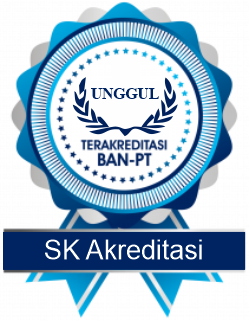Expected Learning Outcomes
The Bachelor of Mathematics Education Program outlines the Graduate Learning Outcomes (GLOs) that students must achieve upon completing the entire educational process in the program. These outcomes are formulated based on the Indonesian National Qualifications Framework (KKNI) and the National Standards for Higher Education (SN-Dikti), while also considering the professional competency needs of future mathematics educators. The GLOs cover aspects of attitude, knowledge, general skills, and specific skills, which serve as the foundation for curriculum development, instructional tools, and assessment of student achievement.
Attitudes
GLO 1: Demonstrate professional, ethical, and responsible behavior as both individuals and citizens.
GLO 2: Exhibit adaptability and innovation in responding to the development of science, technology, and learners’ needs.
General Skills
GLO 3: Possess comprehensive mastery of school mathematics and advanced mathematics concepts.
GLO 4: Master pedagogical principles and cognitive psychology in mathematics education to understand students' thinking processes and characteristics.
Knowledge
GLO 5: Master current national and international mathematics education curricula, and be able to adapt them to student needs and contemporary developments.
GLO 6: Demonstrate critical, creative, and solution-oriented thinking in problem-solving and adapting to global developments in mathematics education.
Spesific Skills
GLO 7: Communicate mathematical concepts and teaching strategies effectively, both orally and in writing, to students, peers, and the community.
GLO 8: Work collaboratively in multidisciplinary teams and demonstrate leadership and managerial skills in teaching management, education policy development, and educational institution management.
GLO 9: Design, implement, and evaluate mathematics instruction based on pedagogical theory and cognitive psychology to enhance student understanding.
GLO 10: Develop and utilize educational technology, including manipulative media, interactive media, digital-based learning, and artificial intelligence in mathematics education.
GLO 11: Analyze students’ learning difficulties in mathematics and design appropriate intervention strategies based on cognitive psychology approaches.
GLO 12: Innovate mathematics teaching through research and development of effective instructional models aligned with current advancements.
Copyright © 2026,



